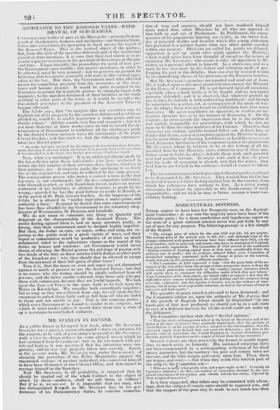RESISTANCE TO THE ASSESSED TAXES—WITH- DRAWAL OF SURCHARGES.
CONSIDERABLE bodies of men in the Metropolis—principally com- posed of shopkeepers, brokers, and mechanics—are forming them- selves into associations for procuring by legal means the repeal of the Assessed Taxes. This is the avowed object of the parties ; but, from the style of the speeches delivered, and of the resolutions passed at their meetings, it is seen that their real intent is to or- ganize a passive resistance to the payment of these taxes at the pre- ent time. Unquestionably, the proceedings we speak of may give the Government some trouble ; but passive resistance, in order to be effectual, must be very general ; and we perceive no ground for believing that tax-payers generally will unite in this virtual oppo- sition to the law. But then, the Government must take effectual means for compelling payment from the recusants, or the resis- tance toll/ become general. It would be quite as unjust in the Executive to permit the Lambeth grocers to smuggle sugar with impunity, to the manifest detriment of their brethren in the trade residing in other parts of the town, as it would be to suffer the threatened resistance to the payment of the Assessed. Taxes to become effectual.
The Globe says, that "to imagine that any executive can be friglited out of its propriety by the senseless threats and rcsulut ions alluded to, would be to render legislation a make-game, and au- thority a farce." All this sounds very fine and energetic ; but it is not more than two or three weeks since we had to record the de- termination of Government to withdraw all the surcharges made by the district Crown surveyor upon the inhabitants of St. Paul, Covent Garden ; and this week we lin& the following announce- ment in a Bristol paper- " An order has been received by the surveyor of this district from Govern- ment, directing in all eases where snreharges have recently been made, or where it was intended to make them, that further proceedings should be ,tayed."
Now, what is a surcharge? It is an additional charge made by the tax-collector upon those individuals who have neglected to return the full number of their servants, dogs, horees, windows in their premises, &c. If correctly made, the surcharge is as fi!irly due as the original tax, and may be collected by the same process. The conscientious person who makes a correct return in the first ins'anee, is not surcharged ; but the less scrupulous individual, who through neglect, or with fraudulent intent, makes an untrue statement of his liabilities, is allowed, it seems, to profit by his wrong,—provided he has the good fortune to reside in Bristol, or in the parish of St. Paul, Covent Garden. In the language of the Globe, he is allowed to "render legislation a make-game, and authority a farce." It cannot be denied that sonic encouragement has been thus afforded by the Government to the refractory shop- keepers of Westminster, St. Pancras, and Lambeth.
We do not mean to volunteer any thing so Quixotic and desperate as the championship of the Assessed Taxes. The public feeling against them is, and on many accounts justly, so strong, that their continuance must be deeMed highly impolitic. But then, the duties on corn, on sugar, coffee, and soap, are in- jurious to the public weal in a great variety of ways, and their repeal or commutation would be productive of at least as much substantial relief to the industrious classes as the repeal of the duties on houses and windows: yet Government would never dream of allowing the Bristol grocers the privilege of paying only two thirds of the duty on those articles which dealers in other parts of the kingdom pay : why then should they be allowed to escape from the payment of their full quota of other taxes ?
True it is, that the taxes on corn and sugar are not clamoured against so much at present as arc the Assessed Taxes ; but that is no reason why the former should be rigidly collected from all persons, and the latter rigidly collected from those only who pay them with submission, because they are lawful imposts. We look upon the Assessed Taxes in the same light as we look upon the Taxes on Knowledge. We consider both exceedingly impolitic; but as long as they are collected from any, we call upon the Go- vernment to collect them fairly and in full from all who are liable to them and not unable to pay. This is but common justice which every Government is bound to render to its subjects, and which it must render unless it would drive them into a state of op n resistance to established authority.




















 Previous page
Previous page